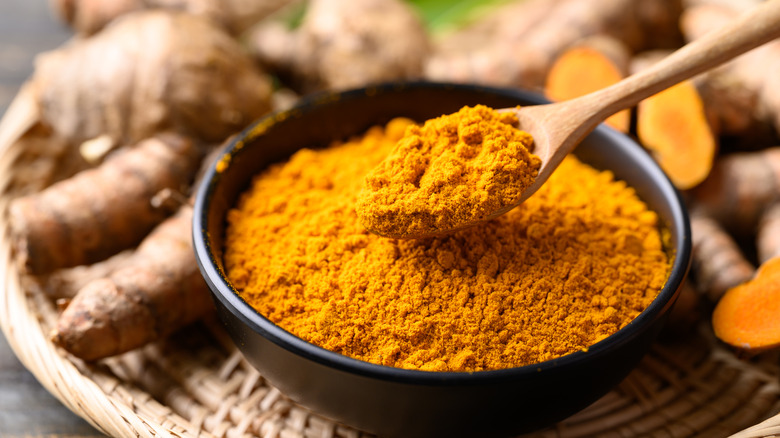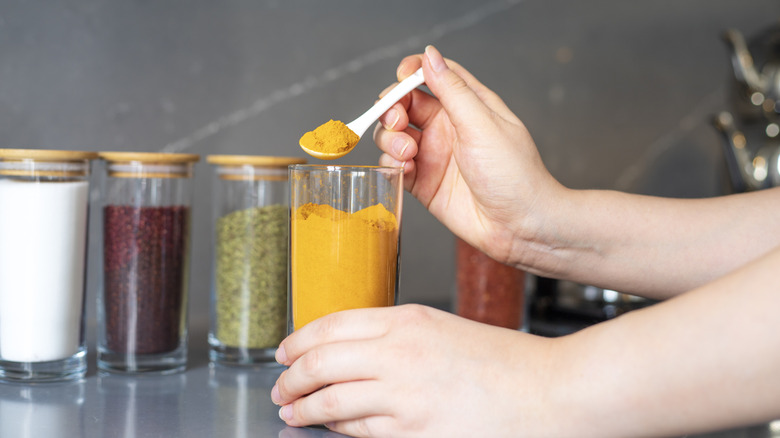If You Have Type 2 Diabetes You May Want To Add Turmeric To Your Diet — Here's Why
People with type 2 diabetes need help controlling their blood sugar because their bodies either don't produce enough insulin to bring their glucose down to healthy levels or don't use insulin effectively. Without enough insulin, glucose can build up in the bloodstream and damage blood vessels, nerves, and organs.
If you've been diagnosed with type 2 diabetes, your doctor may suggest different ways to keep your blood sugar in a healthy range. This might include healthy eating, exercise, weight loss, and possibly certain medications (you may also be able to help manage blood sugar with this hack using whey protein). You might also consider adding some turmeric to your diet.
No, simply sprinkling a little turmeric on your food won't really do the trick. According to a 2021 review in Frontiers in Endocrinology, turmeric supplements can help reduce inflammation and oxidative stress, both of which can lead to or worsen type 2 diabetes. Turmeric's powerful bioactive compound, curcumin, has been shown to significantly lower fasting glucose, hemoglobin A1c (HbA1c), and body mass index.
How turmeric may help control complications from type 2 diabetes
People can live for many years with high blood sugar without realizing they might have type 2 diabetes. High blood sugar can cause symptoms such as increased urination, thirst, or appetite, while some people may experience fatigue, blurred vision, or frequent infections. Deep inside the body, harmful substances called advanced glycation end products (AGEs) can build up when blood sugar stays high for too long. These AGEs trigger inflammation and oxidative stress. Inflammation can make the body less sensitive to insulin, which means blood sugar levels may stay elevated.
The curcumin in turmeric is a powerful antioxidant that can also block inflammatory markers and protect nerves from damage. Turmeric may help people with type 2 diabetes by improving how the body uses insulin, supporting blood vessel health, and maintaining kidney function. Curcumin may also help balance hormones, reduce cholesterol, and improve sleep, according to the Frontiers in Endocrinology review. The amount of curcumin used to manage type 2 diabetes in these research studies typically ranges from 1,000 to 1,500 milligrams per day. Some studies have found antidiabetic effects with 80 milligrams of nano-curcumin, which is absorbed more effectively by the body than regular curcumin, according to a 2020 article in Frontiers in Pharmacology.
Why to avoid taking too much turmeric
Turmeric has been used in Ayurvedic medicine and other alternative practices for centuries and may provide extra support in managing blood sugar. However, you should not replace your doctor's treatment plan with turmeric. Turmeric can add great flavor to your meals, but the concentrated curcumin found in turmeric supplements may cause nausea or diarrhea. Even the concentrated turmeric shots sold in produce aisles may not be safe if you consume them too often.
A 2025 article in Case Reports in Gastroenterology described a 40-year-old woman who was hospitalized with drug-induced liver injury, even though she did not take medications or drink alcohol. Instead, she had been drinking homemade "wellness shots" made from ground turmeric, black pepper, orange juice, and apple cider vinegar for five months before ending up in the emergency room. Because piperine in black pepper increases the body's absorption of turmeric, doctors believed this combination caused toxicity in her liver. Her liver function did not fully recover until more than four months later.


